Written by:David Yaffe-Bellany and Kenneth P. Vogel, The New York Times
Translated by: Yangz, Techub News
This industry’s meticulous public relations effort towards Trump has created one of the wildest lobbying battles in Washington in recent years.
Just over a year ago, David Bailey sat at the negotiation table in the Mar-a-Lago conference room with a group of Bitcoin giants, lobbying Trump. They were looking for a savior.
For years, cryptocurrency companies faced a full-scale crackdown in Washington—waves of lawsuits, regulatory assaults, and criminal accountability pushed the industry to the brink of survival. Trump was not a natural ally; he had publicly mocked Bitcoin as a "scam." However, when the industry suddenly caught his attention, the former president welcomed executives into his private club in Florida. At that time, Bailey was mobilizing cryptocurrency investors to vote for Trump and calling on peers to raise $100 million for his campaign.
At Mar-a-Lago, the delegation brought by Bailey included representatives from several Bitcoin mining companies—an energy-hungry industry long plagued by noise complaints and environmental controversies. They first explained the economic benefits of Bitcoin to Trump and then made a bold request: could the president post a supportive message on social media?
According to a copy of the meeting agenda obtained by The New York Times, a draft post was listed at the bottom of the agenda. "He said he would consider it," recalled Bailey, CEO of BTC Inc., "(but) we had no idea at the time."
That evening, Trump posted the executives' precise wording on Truth Social: "We want all remaining Bitcoin to be mined in the USA!!! This will help us achieve energy dominance!!!" This post became one of the first victories in the high-stakes lobbying battle for the cryptocurrency industry, injecting massive funds into Trump’s campaign and yielding astonishing returns.
Since Trump’s election, Bitcoin has surged to over $100,000, allowing his supporting executives to reap substantial profits. Those cryptocurrency advocates who were previously shut out of Washington during Biden's administration can now navigate the White House with ease. The new government quickly loosened regulatory constraints and introduced comprehensive pro-cryptocurrency policies that could reshape the U.S. financial system for decades to come.
All of this stems from one of the wildest lobbying battles in recent years. Over several months, industry executives, professional lobbyists, campaign operatives, Trump’s business partners, and family members orchestrated a seemingly loose yet remarkably effective influence campaign that transformed a politician who once publicly questioned Bitcoin into one of cryptocurrency's most important supporters.
Every step of Trump’s transformation was almost meticulously guided by the cryptocurrency industry. Based on documents, audio recordings, and interviews with over 50 individuals involved in Trump’s cryptocurrency plans, it is clear that although he knew little about the technical details, when Trump realized that cryptocurrency could bring him and his political group substantial profits, he readily accepted it, delegating specific matters to industry advisors with business ambitions.
Now he is deeply entrenched in this industry, which should be under government regulation—a field that was originally born as a rebellious choice against big banks. Last fall, he and his sons launched their own cryptocurrency business, initiating a series of new projects that now include four Trump-branded digital currencies and even a Bitcoin mining company.
At certain moments, the only effective counterbalance to the power of this industry has been the competition among various cryptocurrency interest groups trying to influence Trump. This competition sometimes resembles a bidding war.
This spring, global cryptocurrency investors spent nearly $200 million to purchase the Memecoin promoted by Trump, just to gain a chance to advise the president at a dinner. Additionally, cryptocurrency interest groups donated about $18 million to Trump’s inauguration committee and contributed millions more to his political group, while also spending over $130 million to support congressional candidates who back the industry. Although legal, this influence operation that combines the president's personal profits with corporate lobbying strategies is shocking even by Washington's standards.
"Nothing in the past compares to what I see now," said Maxine Waters, the top Democrat on the House Financial Services Committee, in an interview. "The scale of funding has exceeded the norm."
White House spokesperson Harrison Fields stated in a statement that the Trump administration is "delivering on the president's promise to make the U.S. the global capital of cryptocurrency by promoting innovation and economic opportunity." Many of Trump’s allies emphasize that while he is willing to listen to various opinions, he ultimately makes important decisions on his own. "No one can convince him to do anything except Trump himself," Bailey said.
Modern Art or Whatever
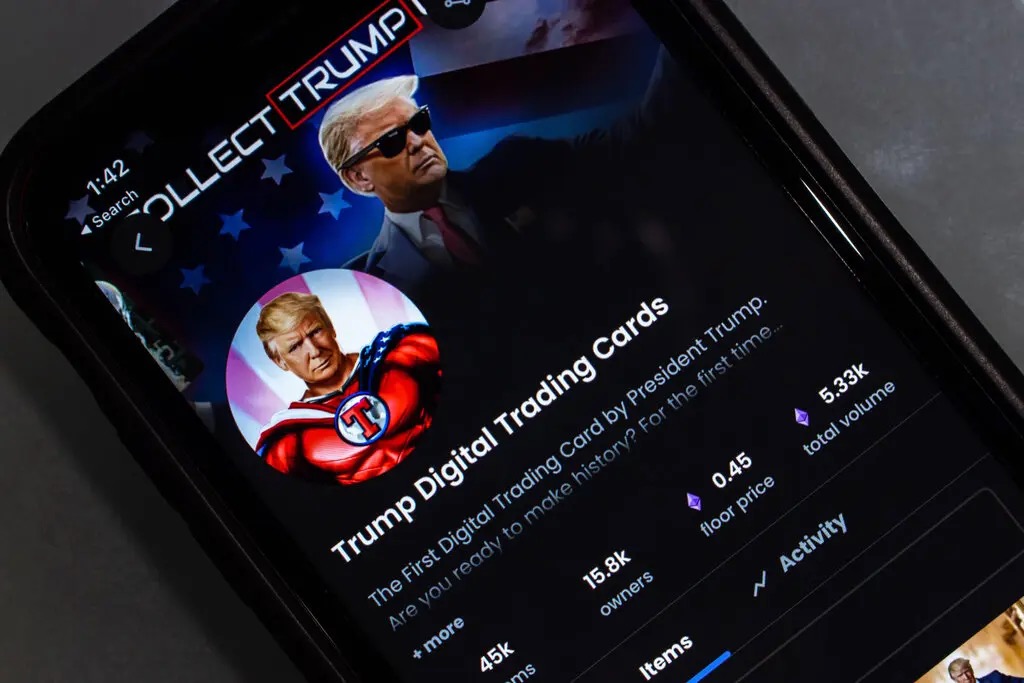
Trump, persuaded by his long-time business partner Bill Zanker, issued a series of Trump-branded NFTs in 2022. These digital collectibles sold out almost instantly.
In the cryptocurrency circle, there is a specific term for the transformation of Bitcoin skeptics—"orange pill," which refers to Bitcoin's iconic color and alludes to a classic scene from the 1999 film "The Matrix." Trump was a key target of their efforts. The former president had publicly declared that cryptocurrency was "not money" and "baseless," but it is well known that he is "flexible" on most issues. Cryptocurrency advocates just needed to find the right communication strategy and spokesperson.
After being approached by long-time business partner Bill Zanker, Trump’s attitude towards cryptocurrency began to soften.
In the 1980s, Bill Zanker founded the for-profit education institution Learning Annex, inviting celebrities, including Trump, to teach success principles. Later, Zanker co-authored books with Trump and ventured into various businesses, including massage equipment and fitness devices.
By 2022, Zanker, who had transitioned into a cryptocurrency entrepreneur, pitched the NFT concept to Trump—these digital collectibles based on cryptographic technology are akin to baseball cards of the internet age. Each NFT features a cartoon image of Trump in various forms, such as an astronaut, cowboy, and superhero. Zanker told Trump that these NFTs could generate $100 million.
This batch of NFTs, named “Trump Digital Trading Cards”, was released in December 2022 and almost immediately sold out (according to a financial disclosure document submitted last year covering the first few months of 2023 and early 2024, Trump profited over $7 million from it).
About a year after the initial release, in November 2023, cryptocurrency enthusiasts who purchased NFTs were invited to Mar-a-Lago to meet Trump, marking a key moment in Trump’s shift in stance. He publicly expressed his support for cryptocurrency investment for the first time in front of supporters.
According to audio recordings obtained by The New York Times, when Trump spoke to the guests, he seemed uncertain about how to describe this peculiar new financial product he was selling—"modern art or whatever," he said. But he was confident that he could make a lot of money from these images sold at $99 each.
"They sold out in less than a day," Trump said, "I could have priced them at $199, $299, $399, or even $499."
In early May 2024, as the presidential campaign heated up, Trump hosted another event for NFT holders at Mar-a-Lago. According to recordings obtained by The New York Times, during a free Q&A session, a guest asked Trump if he would accept campaign donations in cryptocurrency. Despite making a promise, Trump's tone remained hesitant. "If it’s not possible now," he replied, "I will make sure it becomes possible." About two weeks later, Trump’s campaign team officially announced that they would accept cryptocurrency donations.
The Frenzied "Courtship" of a Presidential Candidate
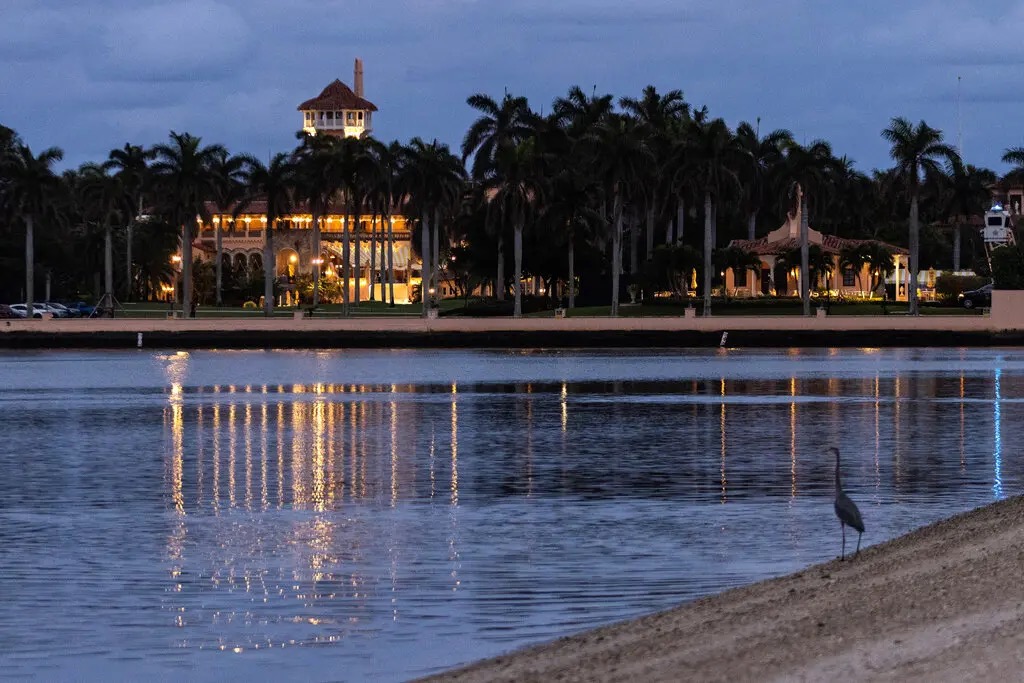
Trump's Mar-a-Lago. Countless meetings and fundraising dinners held here attracted many cryptocurrency executives.
The cryptocurrency industry needed more than just the next president to accept their money. Industry giants were looking for a political spokesperson.
During President Biden's term, the U.S. Securities and Exchange Commission (SEC) filed lawsuits against several large cryptocurrency companies, marking the beginning of a years-long legal battle. Massachusetts Democratic Senator Elizabeth Warren gathered a group of influential lawmakers, insisting that cryptocurrency posed a fundamental threat to the economy. The industry's lobbying efforts towards Biden's re-election campaign largely ended in failure.
Thus, in early 2024, a small group of cryptocurrency executives began a frenzied "courtship" of Trump. Key figures attempting to influence Trump's stance on cryptocurrency included:
David Bailey, CEO of BTC Inc.
David Sacks, Silicon Valley venture capitalist and White House cryptocurrency affairs director
Brad Garlinghouse, CEO of Ripple
Stuart Alderoty, Chief Legal Officer of Ripple
Charles Hoskinson, founder of Input Output
Paul Manafort, former chairman of Trump’s campaign team
Bill Zanker, Trump’s long-time business partner
Tracy Hoyos-López, Bitcoin advocate/former prosecutor
Brian Ballard, Trump’s main fundraiser and lobbyist
Reince Priebus, former White House Chief of Staff
Eric Trump, Trump’s second son
One of the core figures in this lobbying effort, David Bailey, was responsible for organizing one of the largest corporate summits in the cryptocurrency industry. He worked closely with Bitcoin advocate and former prosecutor Tracy Hoyos-López, who had key connections, as her father was close friends with Paul Manafort, the chairman of Trump’s 2016 campaign team.
In May 2024, through Manafort's introduction, Bailey was able to hold an initial meeting with Trump at Trump Tower. "Paul saw a political opportunity," Bailey said, "he himself is a staunch supporter of Bitcoin."
At that time, Trump was embroiled in a criminal trial in Manhattan (involving illegal campaign contributions) and only returned to Trump Tower after daily court sessions. Bailey attended with three other cryptocurrency advocates. They proposed that cryptocurrency investors could become a key voting bloc on par with the gun association and pointed out that Senator Warren was one of the industry's main opponents. Bailey revealed that he presented a chart showing Bitcoin's price increase during Trump's first term, referring to it as the "Trump Pump." According to Bailey, Trump happily repeated this term.
Five days later, Trump delivered a speech at the Libertarian National Convention, promising to "stop Biden from destroying the cryptocurrency movement" and "prevent Elizabeth Warren and her allies from getting their hands on your Bitcoin." Soon, millions of dollars in cryptocurrency funds began flowing into Trump's campaign account. Founders of cryptocurrency exchanges Kraken and Gemini, both facing lawsuits from the SEC, each donated over a million dollars to pro-Trump groups.
In June, venture capitalist David Sacks hosted a fundraising dinner for Trump at his private home in San Francisco, where the candidate dined with several executives, including Coinbase's chief lawyer—this largest U.S. exchange was also under SEC investigation. Meanwhile, Bailey was actively mobilizing support, claiming he not only arranged for Bitcoin mining executives to visit Mar-a-Lago in June but also raised $30 million for Trump's election campaign.
Most importantly, Bailey successfully invited Trump to be the keynote speaker at the annual Bitcoin conference in Nashville. This event, organized by Bailey's company, was expected to attract tens of thousands of cryptocurrency enthusiasts, providing a rare opportunity to reach potential supporters.
Two weeks before the speech, Trump was shot in the right ear at a campaign rally in Pennsylvania. However, he remained undeterred and insisted on fulfilling his commitment to Bitcoin believers. "He specifically had the team contact us to express that he would attend the conference no matter what," Hoyos-López revealed in a cryptocurrency podcast this year.
Additionally, as the conference approached, Bailey learned that Wyoming Republican Senator Cynthia Lummis was planning to propose the establishment of a national Bitcoin reserve and immediately suggested that Trump's campaign team support the proposal.
Bailey realized that this was equivalent to a "Fort Knox" for the digital age, where the Federal Reserve would provide official endorsement for the long-ignored cryptocurrency industry, granting Bitcoin the strategic asset status equivalent to gold and oil. Trump also fulfilled his promise again, pledging to establish a "national Bitcoin strategic reserve" in front of thousands of cheering supporters in Nashville. Trump solemnly announced that "I will be the president America needs to support innovation and champion Bitcoin."
The Withdrawn Invitation
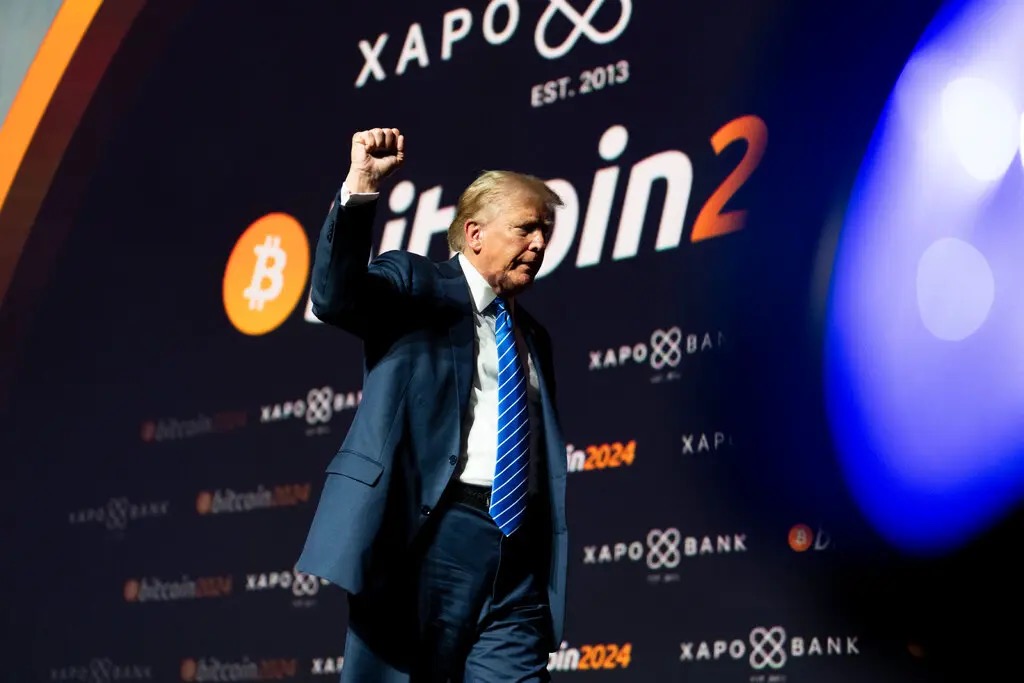
Two weeks after being shot in the right ear, Trump still appeared as promised at the Nashville Bitcoin annual conference to deliver a speech.
If the "orange pill" transformation of Trump began with behind-the-scenes operations on the fringes of the presidential campaign, it became a public political spectacle after his victory in November.
Within a month of his victory, Trump appointed Sacks as the "czar of artificial intelligence and cryptocurrency," giving him full responsibility for government technology policy.
However, the entire cryptocurrency world was vying for direct access to the White House. In the first three months of 2025, cryptocurrency companies and executives spent a staggering $9.9 million on lobbying.
Days after the inauguration, Coinbase, which had donated a million dollars to the inauguration fund, announced the hiring of Chris LaCivita, a core member of Trump's campaign team, to join its global advisory board. Additionally, three insiders revealed that Manafort, who was convicted for overseas lobbying in 2018 and later pardoned by Trump, had begun advising cryptocurrency interest groups on how to approach the core of presidential power.
Among them, the most radical "courtiers" were from Ripple. This cryptocurrency company, deeply involved in cross-border payments, had been battling the SEC for years. In January of this year, Ripple donated nearly $5 million to Trump's inauguration committee, becoming the second-largest donor. In the first three months of 2025, Ripple spent another $400,000 on lobbying, most of which went to two Trump-affiliated firms, including Ballard Partners, led by fundraising powerhouse Brian Ballard, and Michael Best Strategies, which included LaCivita and former White House Chief of Staff Reince Priebus on its advisory board.
Days after donating to the inauguration fund, Ripple CEO Brad Garlinghouse dined with Trump at Mar-a-Lago. Garlinghouse attended with the company's Chief Legal Officer, and the guests included Trump's fundraising associate Meredith O'Rourke, senior fundraising consultant Bridget G. Nocco from Ballard Partners, and Priebus.
In January of this year, Garlinghouse revealed in an interview with The New York Times that he had suggested to Trump and his team to expand the Bitcoin reserve plan proposed in Nashville, advocating that the U.S. should stockpile various cryptocurrencies, including XRP.
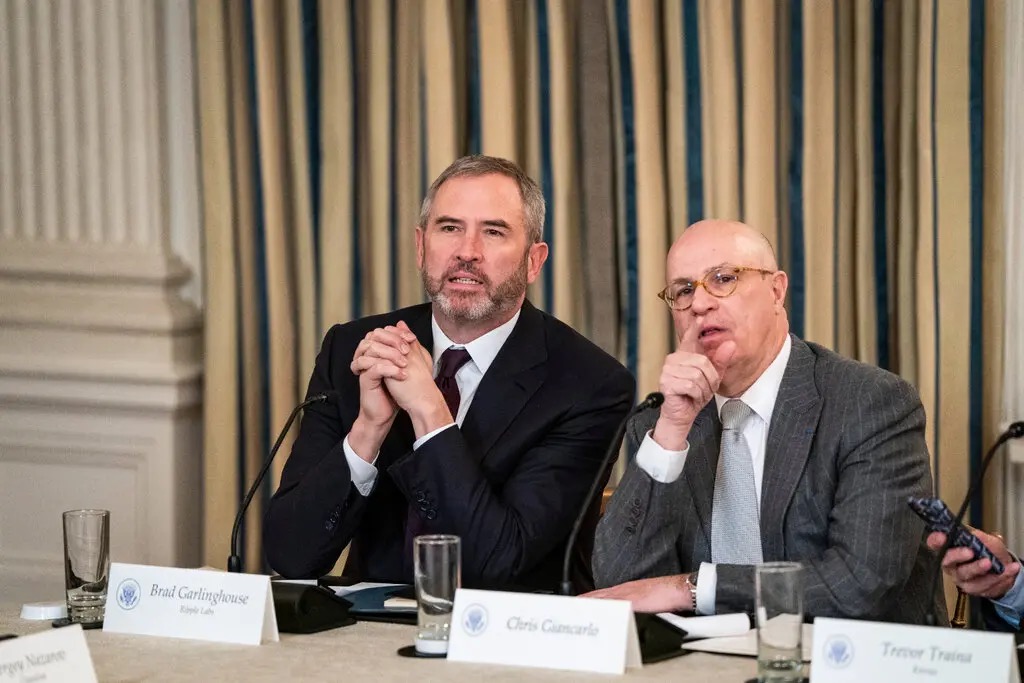
Ripple executives prominently shared photos with the incoming president on social media, showcasing the dinner. "The red wine braised beef was indeed delicious," Ripple's Chief Legal Officer Stuart Alderoty wrote.
However, this display sparked discontent among peers. Notable cryptocurrency entrepreneur Charles Hoskinson publicly mocked Ripple executives. He sarcastically stated on social media, "This dinner with Trump cost them $5 million," alluding to Ripple's exorbitant donation to the inauguration committee.
Yet, Hoskinson also harbored political ambitions. His company, Input Output Global, had donated $250,000 to Trump's inauguration committee, and he was eager to push cryptocurrency legislation on Capitol Hill. After the inauguration, Hoskinson paid a million dollars to a pro-Trump political action committee, gaining access to another fundraising dinner at Mar-a-Lago.

However, on his way to the dinner on March 1, Hoskinson received shocking news—his invitation had been revoked. He was informed that the Secret Service had found "issues" during the background check.
Although he later received a refund, Hoskinson stated in an interview that he was still waiting for a full explanation of the incident. According to Hoskinson, dinner organizer O'Rourke provided a possible reason. She suggested that the issue might stem from his previous mocking tweet about Ripple.
"I Kept My Promise"
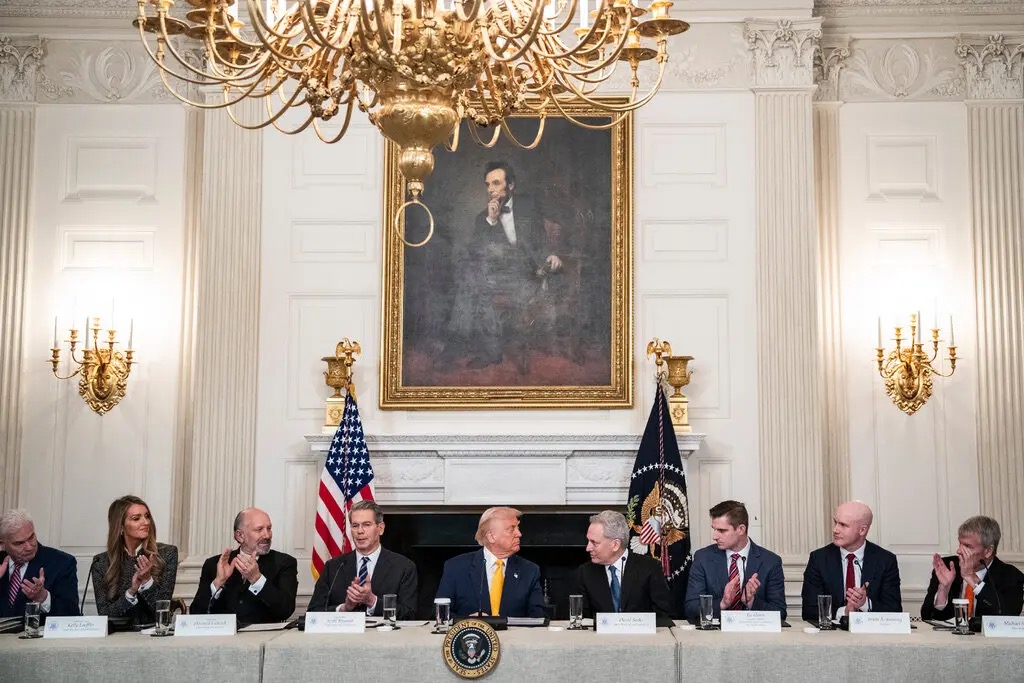
In March, Trump hosted a digital asset summit at the White House with David Sacks and other government officials and tech executives.
The dinner ultimately became a golden opportunity for Ripple.
Among the attendees were several familiar faces from the January "red wine braised beef dinner," including Ripple's Alderoty and Ballard's Nocco. As a regular at Trump's fundraising events, Nocco's husband is a well-connected county sheriff in Florida, and she has a close relationship with Trump, often affectionately referred to as "the sheriff's wife."
According to six anonymous insiders, Nocco advised the president that "Ripple has been so generous to you, XRP should be included in the reserves." Trump accepted her suggestion. The next morning, Trump announced on Truth Social that he had instructed the presidential working group to advance the "cryptocurrency strategic reserve" plan, including XRP and two other digital currencies—ADA from Hoskinson's company, which had previously been excluded, and SOL from Solana Labs.
The news shocked the cryptocurrency industry. To many, these tokens could not compare to Bitcoin, and this move was akin to stacking copper coins next to pure gold bars in Fort Knox. In response, Hoskinson and Solana co-founder quickly distanced themselves from the situation, while a Ripple spokesperson declined to comment.
Four insiders stated that Trump was soon advised by allies that he was being manipulated by Ripple project advisors. After the post was made, the price of XRP surged by 33%—a figure that was prominently reported by aides. (The details of the incident were first disclosed by Politico.)
Faced with strong opposition behind the scenes, "crypto czar" Sacks urgently clarified on X platform that the reserves proposed by the president would include "top cryptocurrencies like Bitcoin," in line with campaign promises. Three minutes later, Trump also added, "Of course, it also includes Bitcoin and Ethereum!"
This policy update also immediately created a direct beneficiary—World Liberty Financial, a cryptocurrency company owned by the Trump family. The company had just made a significant purchase of Ethereum, which appreciated by $33 million following this announcement.
Two insiders revealed that although Trump felt used and ordered the Ballard team to cease participation in his fundraising activities, after Ballard personally intervened at the White House, the two sides reconciled.
Ultimately, the reserve plan took a moderate form. On March 6, Trump issued an executive order, calling for the establishment of a federal reserve agency to store Bitcoin obtained through legal seizures and promising to consider acquiring more Bitcoin in the future.
Trump reviewed the documents in his office with Sacks.
Trump asked, "Is this really a policy you fully agree with?"
"One hundred percent," Sacks replied.
"And I kept my promise, right?" Trump confirmed again.
"Without a doubt," Sacks responded.
In the end, Trump signed the executive order.
免责声明:本文章仅代表作者个人观点,不代表本平台的立场和观点。本文章仅供信息分享,不构成对任何人的任何投资建议。用户与作者之间的任何争议,与本平台无关。如网页中刊载的文章或图片涉及侵权,请提供相关的权利证明和身份证明发送邮件到support@aicoin.com,本平台相关工作人员将会进行核查。



